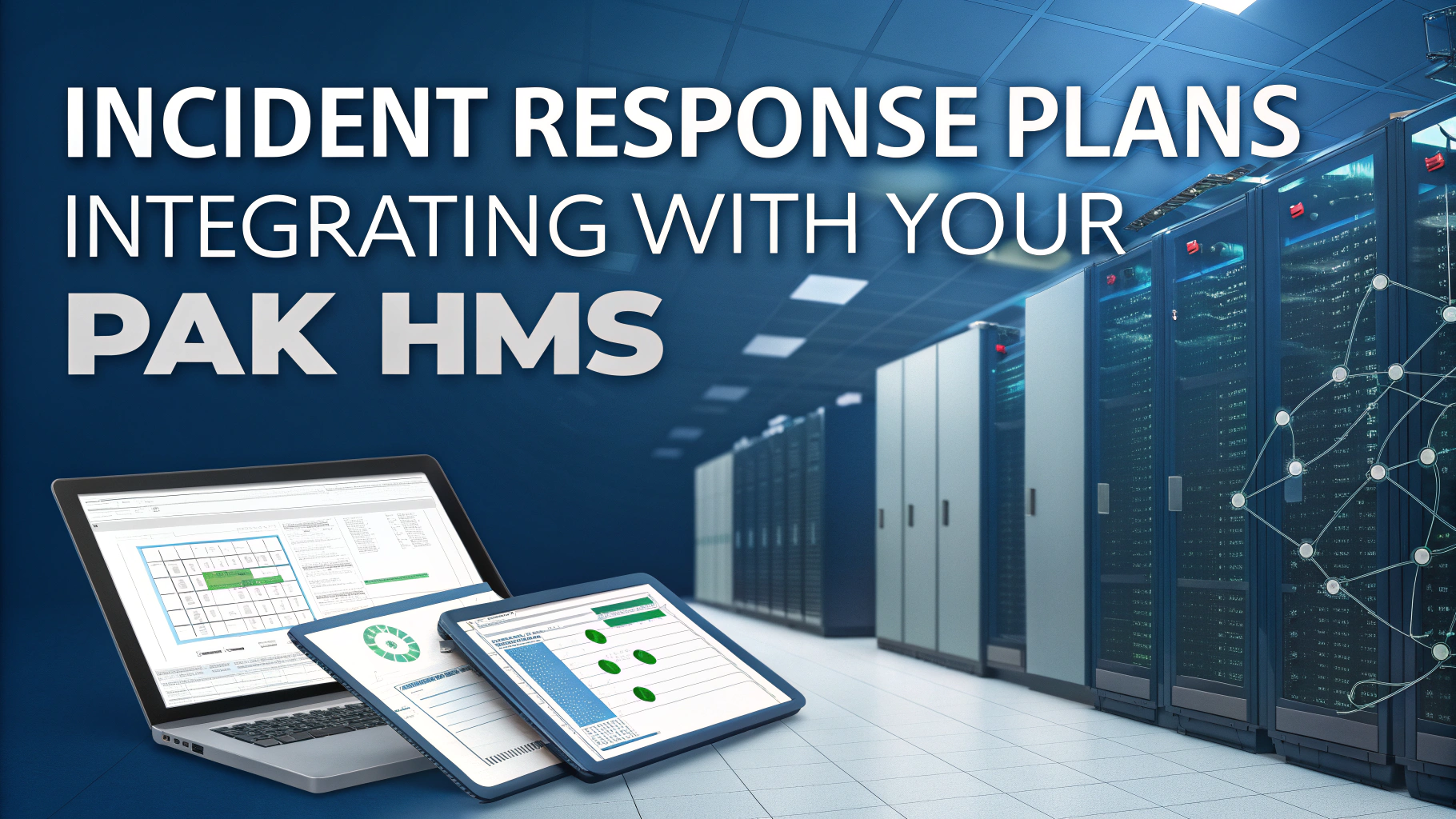Incident Response Plans: Integrating with Your PAK HMS (2025 Guide for Hoteliers)
In today’s digitally dependent hospitality environment, the question is no longer if a security incident will occur—but when. Whether it’s a cyberattack, system outage, or data breach, hotels must be prepared to respond swiftly and systematically to minimize damage.
For properties using PAK HMS, Pakistan’s leading cloud-based hotel management platform, developing and integrating an Incident Response Plan (IRP) is not just a best practice—it’s a business necessity. Hotels that have a documented, tested, and integrated response process experience faster recovery, reduced losses, and better guest trust during crises.
In this article, we’ll walk through:
- What constitutes a hotel security incident in 2025
- Why every PAK HMS-powered hotel needs a robust IRP
- Core components of a hospitality-focused IRP
- How to integrate and automate incident response with PAK HMS
- Real-world use cases and response playbooks
- Tips for training your staff and running response drills
🛑 What is a Security Incident in Hotel Operations?
A security incident is any event that threatens the confidentiality, integrity, or availability of your hotel’s systems, services, or guest data.
Common Incident Types in 2025:
| Incident Type | Example |
|---|---|
| Cybersecurity breach | Guest data leaked via phishing or malware |
| System downtime | HMS outage due to hosting or update errors |
| Payment fraud | Compromised credit card used at check-in |
| Unauthorized access | Ex-employee logs into admin dashboard |
| Third-party compromise | A partner POS system breach affects your HMS |
| Physical asset theft | Lost laptop with unencrypted data |
🚨 Why You Need an Incident Response Plan (IRP)
A response plan helps your team:
- React fast when time is critical
- Minimize revenue loss and data exposure
- Meet legal obligations (e.g. data breach disclosure)
- Preserve brand reputation
- Ensure continuity of operations
According to IBM’s 2024 Report, organizations with formal IRPs reduce the cost of a breach by 42%.
🧱 Core Components of a Hotel Incident Response Plan
An effective IRP contains six key stages, often referred to as the SANS framework:
- Preparation – Policies, tools, team roles, and drills
- Identification – Detecting and validating an incident
- Containment – Isolating the threat to limit impact
- Eradication – Removing the cause (e.g., malware, breached credentials)
- Recovery – Restoring services and confidence
- Lessons Learned – Debriefing and improving for next time
🛠 Integrating Incident Response with PAK HMS
PAK HMS offers a secure, modular architecture that supports IRP automation and transparency.
🔐 1. Real-Time System Monitoring & Alerts
- Monitor login attempts, data exports, payment failures
- Enable alert thresholds for multiple failed logins or unauthorized access
- Connect with third-party SIEM platforms for extended detection
👥 2. Role-Based Access Control
- Control which staff can access guest data, admin settings, and financial tools
- Create emergency override roles for IT during a crisis
📋 3. Audit Logs & Data Trails
Every action is logged: who accessed what and when. Logs can be exported during an investigation to aid containment and compliance.
🧾 4. Data Anonymization & Export
Fulfill legal obligations for data disclosure under GDPR/PDPB and export guest data summaries for incident reporting.
💬 5. Staff Notifications
- Use in-app messaging to broadcast alerts to front desk and managers during incidents
- Templates for phishing warnings, payment fraud, or PII exposure

📄 Sample PAK HMS Incident Response Playbook
Scenario: Suspicious Admin Login from Unknown IP
- Identification – System detects login to super admin account from overseas IP at 3:14 AM. Alert triggered in dashboard and emailed to IT lead.
- Containment – IT uses “Emergency Lock” to suspend admin access, invalidate session tokens, enable two-factor re-authentication.
- Eradication – Force password reset, review admin activities, patch vulnerabilities.
- Recovery – Confirm integrity, restore access, notify OTAs and partners.
- Lessons Learned – Update password policies, review thresholds, train staff.
📊 Building Your Hotel’s Incident Response Team
| Role | Responsibility |
|---|---|
| Incident Commander (GM or Ops Head) | Activates plan, coordinates departments |
| Technical Lead (IT Admin) | Investigates cause, applies containment |
| Communications Lead (Front Office Manager) | Guest messaging and OTA updates |
| Legal/Compliance | Manages data breach laws, PR, regulators |
| PAK HMS Liaison | Coordinates with HMS support for intervention |
📑 Templates to Include in Your IRP Binder
- Incident Report Form
- Contact Sheet (internal + external vendors)
- Guest Communication Scripts (breach, downtime)
- PAK HMS Audit Log Access Guide
- Data Export SOP
- Recovery Timeline Chart
- Legal Breach Notification Templates (GDPR, PDPB)
📅 Run Response Drills: Simulate Before You Scramble
Running mock scenarios is essential to test how well your IRP works.
Sample Drills:
- Admin login compromise (phishing + suspicious location)
- Guest data leak via misconfigured API
- POS device ransomware attack
- HMS service outage during peak check-in
Use PAK HMS’s sandbox environment to safely simulate incidents.
🧠 Staff Training: The First Line of Defense
Many incidents start with human error. Use PAK HMS’s LMS modules to:
- Educate front desk on spotting phishing
- Train housekeeping on lost device protocols
- Quiz management teams on response priorities
Provide reward incentives for perfect drill performance or reporting a live phishing attempt.
🧰 Tools to Integrate with PAK HMS for Incident Response
| Tool | Use |
|---|---|
| SIEM (Splunk, Wazuh) | Central log monitoring and alerting |
| Slack/Teams | Internal comms during live incidents |
| Freshdesk/Jira | Ticketing for incident tracking |
| DataDog, Uptime Robot | System health & availability tracking |
| Legal CRM | Track regulatory correspondence |
🧭 Legal Obligations After a Breach
| Regulation | Timeline |
|---|---|
| GDPR | Notify authorities within 72 hours |
| Pakistan PDPB (expected) | Disclose within 7 days of breach confirmation |
| PCI-DSS | File report with acquiring bank ASAP |
| OTA Partnerships | May require notification within 24–48 hours |
✅ IRP Checklist for PAK HMS Properties
- ✔️ Documented, tested IRP on file
- ✔️ Key team roles defined and reachable 24/7
- ✔️ 1-click lock down of PAK HMS user access
- ✔️ Run a drill in last 6 months
- ✔️ Know breach reporting timelines by law
- ✔️ Backups verified and stored off-site
- ✔️ Audit logs regularly reviewed
- ✔️ Staff trained on response basics
🔮 The Future of Incident Response with PAK HMS
- AI-based incident scoring
- Automated breach simulations
- Guest-facing incident status pages
- Prebuilt compliance bundles
- Voice assistant IR activation
📌 Final Thoughts: Prepare Today, Recover Faster Tomorrow
Incidents don’t wait for perfect conditions. Whether it’s a power surge, phishing email, or coordinated cyberattack, the hotels that respond quickly and calmly will come out on top.
Your PAK HMS system is built for resilience—but it needs your team to match that readiness. By integrating your Incident Response Plan directly into your HMS tools and workflows, you ensure that guest experience and brand trust remain intact—even under pressure.



Leave A Comment